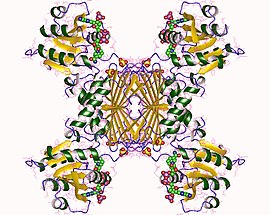4-hydroxy-tetrahydrodipicolinate reductase
Appearance
(Redirected from Dihydrodipicolinate reductase)
| 4-hydroxy-tetrahydrodipicolinate reductase | |||||||||
|---|---|---|---|---|---|---|---|---|---|
 Dihydrodipicolinate reductase tetramer, Corynebacterium glutamicum | |||||||||
| Identifiers | |||||||||
| EC no. | 1.17.1.8 | ||||||||
| CAS no. | 9055-46-3 | ||||||||
| Databases | |||||||||
| IntEnz | IntEnz view | ||||||||
| BRENDA | BRENDA entry | ||||||||
| ExPASy | NiceZyme view | ||||||||
| KEGG | KEGG entry | ||||||||
| MetaCyc | metabolic pathway | ||||||||
| PRIAM | profile | ||||||||
| PDB structures | RCSB PDB PDBe PDBsum | ||||||||
| Gene Ontology | AmiGO / QuickGO | ||||||||
| |||||||||
In enzymology, a 4-hydroxy-tetrahydrodipicolinate reductase (EC 1.17.1.8) is an enzyme that catalyzes the chemical reaction
- (S)-2,3,4,5-tetrahydropyridine-2,6-dicarboxylate + NAD(P)+ + H2O (2S,4S)-4-hydroxy-2,3,4,5-tetrahydrodipicolinate + NAD(P)H + H+
The 3 substrates of this enzyme are (S)-2,3,4,5-tetrahydropyridine-2,6-dicarboxylate, NAD+ or NADP+, and H2O, whereas its 3 products are (2S,4S)-4-hydroxy-2,3,4,5-tetrahydrodipicolinate, NADH or NADPH, and H+.
This enzyme participates in lysine biosynthesis.
Nomenclature
[edit]This enzyme belongs to the family of oxidoreductases, specifically those acting on CH or CH2 groups with NAD+ or NADP+ as acceptor. The systematic name of this enzyme class is (S)-2,3,4,5-tetrahydropyridine-2,6-dicarboxylate:NAD(P)+ 4-oxidoreductase. Other names in common use include:
- dihydrodipicolinate reductase,
- dihydrodipicolinic acid reductase, and
- 2,3,4,5-tetrahydrodipicolinate:NAD(P)+ oxidoreductase.
References
[edit]Further reading
[edit]- Farkas W, Gilvarg C (Dec 1965). "The reduction step in diaminopimelic acid biosynthesis". The Journal of Biological Chemistry. 240 (12): 4717–22. doi:10.1016/S0021-9258(18)97014-6. PMID 4378965.
- Tamir H (1971). "Dihydrodipicolinic acid reductase (Escherichia coli)". Metabolism of Amino Acids and Amines Part B. Methods Enzymol. Vol. 17B. pp. 134–139. doi:10.1016/0076-6879(71)17030-9. ISBN 978-0-12-181877-7.
- Devenish SR, Blunt JW, Gerrard JA (Jun 2010). "NMR studies uncover alternate substrates for dihydrodipicolinate synthase and suggest that dihydrodipicolinate reductase is also a dehydratase". Journal of Medicinal Chemistry. 53 (12): 4808–12. doi:10.1021/jm100349s. PMID 20503968.

